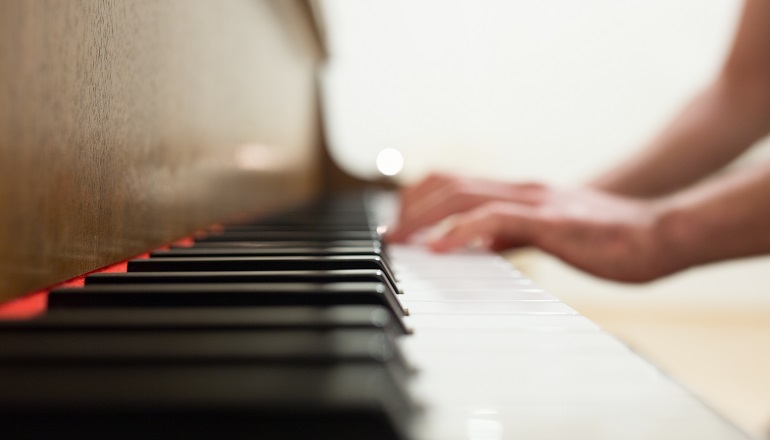We are driving home at the end of the day. My 4-year-old daughter Amelia is concentrating on untying her shoes. I listen to “All Things Considered.”
The Governor of some state—Georgia, maybe—proposes that all newborns listen to classical music. A recent scientific study concludes that music stimulates synapses so that the brain exposed early to music early will later function in abstract terms with greater facility. The governor prefers Country Western but he thinks that classical music will be more soothing. “Ode to Joy,” for example, should be introduced at birth. The government should distribute tapes. I think “Ode to Joy” is many things but I do not think it is soothing. I snicker, then I feel snobbish.
The governor also encourages piano lessons. IQ scores apparently rise significantly in young piano students, for reasons that are being vigorously researched. I wonder briefly about nature versus nurture. I make my living as a musician, but so far, my daughter shuns the piano. I recall my early lessons, the simple arrangement of “Ode to Joy” in Book One. The melody plays in my head.
Amelia has succeeded in taking off her shoes. She wants me to put them on again. “I can’t, I’m going eighty miles an hour,” I say distractedly. She holds up a shoe, toe pointing down, sole towards me, and asks which foot it goes on. My brain is not as agile with spatial relationships as it used to be—I have to glance back three times before I can tell her, and by that time she has lost interest.
NPR is already well into a new piece. Scientists have discovered something crucial about aging. They have located the whatever it is that turns on or turns off the gene that allows for endless division of the cell. Or something. I turn up the volume slightly. I am fifty, Amelia is four. There are benefits to older parenting, but life expectancy is not one of them.
Amelia wants to play the balloon game. She asks for a balloon, then pretends to eat the balloon that I pretend to give her. “Pop, Chomp,” she says, and asks for a different color. She invented this car game herself. I’m afraid I’ll scream if I have to play it. I’m not a good mother. “There is a really interesting story on,” I say. “It’s about growing old.”
The story, what little I can catch of it, tantalizes. Techniques are on the distant horizon to retard the aging process. “Pop, Chomp,” insists Amelia from the back seat. We might all live for centuries someday. Obviously, there are implications. What about population growth? Shouldn’t we be doing better with the time we already have? I wonder when the techniques will be available, just out of curiosity, but I have missed that part of the story.
News headlines now. Another village has been slaughtered. The National Endowment for the Arts might be dissolved. The ice cap is melting and there is nothing, absolutely nothing, we can do about it.
“Chomp,” says Amelia again, interrupting the next news item. Something will end in the year 2020. Social Security? Medicare? With some difficulty, I figure that I’ll be 72 when whatever happens. Amelia will be 24, no, 26. She clamors now: “Pink! Green!” Hurriedly I pretend to blow up five balloons. Then I spend some time feeling frantic about jobs and schooling and financial insecurity, and about the year 2020. I’ve become quite depressed. Maybe I should teach her piano, even if she balks. While there is still time.
The news is over. My mind should be on the highway, but thanks to the Governor of Georgia, or whatever state it is, I’m still hearing “Ode to Joy.” I realize I’ve been hearing it all along, and now I can’t seem to get it out of my head. I meet Amelia’s dark eyes in the rear view mirror. Here is the part where the triangles and piccolos come skipping in, ridiculously hopeful, absurdly beautiful—it’s enough to make you cry. The measured hymn becomes a gay and jaunty march.
Us too, the new little instruments seem to say. They approach and then they take up the tune, lightening it, before they’re swept up and away and into everything else.



